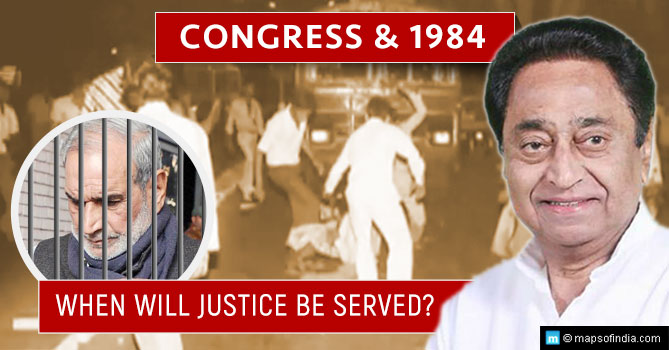Different people would have different things to say about December 17, 2018. What’s so special about that date, one might ask. Well, plenty. Let’s call it a day of ironies, or of juxtaposition. It was the day when Congress had its selected members swearing in as Chief Ministers of three key states- Rajasthan, Chhattisgarh, and Madhya Pradesh.
It was also the day when a historic judgment came from the benches of the Delhi high court. Sajjan Kumar, a prominent Congress leader was sentenced to life imprisonment after being found guilty in a case filed against him for the 1984 mass murders, or anti-Sikh “riots”.
How is that a juxtaposition? Well, in Madhya Pradesh, another veteran Congress leader Kamal Nath was appointed as the new Chief Minister. Nath was among the main accused people for instigating the 1984 violence, for even leading them in instances. While Kumar is now to be imprisoned “for the remainder of his life”, Kamal Nath will be the CM of Madhya Pradesh.
So, what does the arrest signify, what lies ahead? What of those who still seek justice for 1984?
The 1984 riots and Congress
“Truth will prevail and justice will be done”, the Delhi high court said while reaching a verdict on the Sajjan Kumar case. The judgment is historical, because not only did it reverse the 2013 acquittals, but it will also mark the first time a major Congress leader has been punished for the attacks of 1984. Sajjan Kumar has to surrender by December 31st, after which he will remain confined in life imprisonment.
While official data put the death toll at about 3000 people, there is a good reason to believe that the actual numbers were much higher. The attacks began shortly after the assassination of Indira Gandhi, by her two security guards – Beant Singh and Satwant Singh. In the ‘aftermath’, for lack of a better word, thousands of people from the Sikh community were brutally attacked, thrown acid at, murdered, women were reportedly raped. Not even children were spared. Even today, many families continue to live with the horrors of 1984, having lost their loved ones.
What was the role of Congress? Several witnesses have till date placed Congress leaders like Sajjan Kumar, Kamal Nath, Jagdish Tyler etc at the scenes of crime. They were not only present but were seen mobilising the crowd, launching hate speeches, being a participant. According to witnesses, Kamal Nath was seen at the site of Rakab Ganj Sahib, where two Sikh men were burnt alive by the mob, and the Gurudwara was attacked. The attackers were seen carrying voters’ list around, locating down Sikh households, something that would not have been possible without official aid, if not without directives.
The present scenario
When the talks about Kamal Nath being the next Madhya Pradesh CM first started, many naturally pointed back at his reported involvement in the mass murders of 1984. While he was acquitted due to lack of evidence, multiple witness accounts, including that of a senior journalist, have urged that he was on the scene of the crime. Also, his defense for being a Rakab Ganj has often been declared “vague” and “not clear”.
To give Kamal Nath the chief ministerial post certainly sends out a message, and not a good one. Ever since the announcement, many from the public have come up and accused Rahul Gandhi of rubbing salt on old wounds. It’s not just Kamal Nath’s appointment that is problematic, but rather the reactions on Sajjan Kumar’s verdict as well.
When Rahul Gandhi was asked about the riots a day after Sajjan Kumar was convicted, the former refused to address the questions. “I have made my position on the riots very clear, and I have said this before. This press conference is about the farmers of the country…”, he was quoted as saying in the press conference.
A grave mistake, one might say. Kumar’s arrest has come as a matter of celebration for several people, many of who had been waiting decades for justice. It was the first time in more than three decades that a big name was brought to justice. For Rahul Gandhi, who hopes to become Prime Minister in 2019, to treat the matter with such an utter disregard is discouraging, to say the least. Not even his best political decision by a long margin.
Conclusion
1984 is perhaps the biggest red blotch on the track record of Indian National Congress, and therefore, should be treated with the same level of sensitivity. In 2005, the then Prime Minister and Congress leader, Manmohan Singh had apologised for the genocide on behalf of his party. Was that compensating enough? Of course, not. However, it was a necessary (albeit small) step, establishing that the party was sorry about its past.
Now, with Kamal Nath given a key post, the party has essentially gone back to square one again. Should he have been appointed as the Chief Minister? Certainly not. While 2002 continues to haunt the Bharatiya Janata Party, Congress has invited the ghost of 1984 back from the past on its own.






